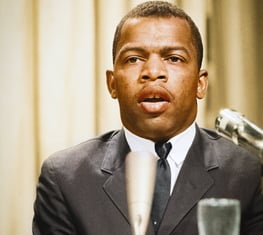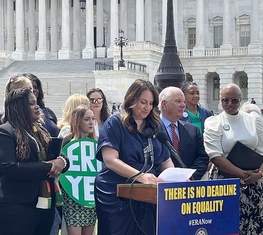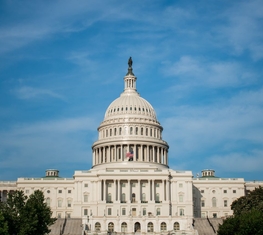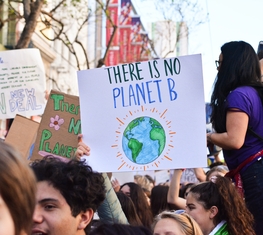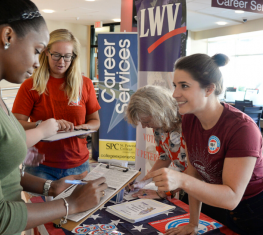The following testimony was submitted to the U.S. House Committee on House Administration, Subcommittee on Elections on October 17, 2019 by Virginia Kase on behalf of the League of Women Voters.
Statement for Virginia Kase, Chief Operating Officer, LWVUS
U.S. House Committee on House Administration, Subcommittee on Elections
October 17, 2019
Chairwoman Fudge, Ranking Member Davis, and Members of the Subcommittee on the Elections of the U.S House of Representatives Committee on House Administration, my name is Virginia Kase and I serve as the Chief Executive Officer at the League of Women Voters of the United States, (“The League”). Thank you for the opportunity to testify today on ‘Voting Rights and Election Administration in America,’ an issue of paramount importance to our more than 400,000 members and supporters.
The League of Women Voters is a nonpartisan organization that was founded nearly 100 years ago in 1920 by women who understood the importance of securing voting rights for women. Since 1920, the League has worked to deliver on our mission to empower voters and defend democracy, and ensuring that that everyone has the right, the desire, the knowledge, and the confidence to participate. The League structure is a federated model with Leagues in every single state as well as the District of Columbia. We have 764 local affiliates who reside in every congressional district in the country. Our members and supporters are strong activists and professionals who believe that the Voting Rights Act must be fully restored with increased access to the polls for the people.
In 2018, the League protected 4.2 million voters through pre-litigation, litigation, and civic education and engagement mechanisms.
- Working with Secretaries of State in 5 jurisdictions, the League labored tirelessly to eliminate purges of voter rolls using the National Voter Registration Act (NVRA) in southern and southwestern states. The League was the lead organization in advancing the NVRA in the 1990s, and we are currently the chief enforcer of the law.
- Next, the League was plaintiff in nearly two dozen cases centered around voting rights and won more than half those cases to protect rights of disproportionately impacted voters (i.e. minority voters). The League has also worked to protect voters at the ballot box through a robust observer corps and poll watching on Election Day as well as holding more than 1,000 meetings with election administrators prior to the November 2018 midterm election to assist in educating voters to mitigate voter misinformation and assist voters in overcoming obstacles on Election Day.
- Finally, the League is well-known for our civic education and engagement in communities across the country. The League works to educate voters through our premier online platform VOTE411.org, our one-stop shop for voter information on candidates at the state and local levels. This information is also printed by League affiliates into voter guides to help educate members of the public around the offices up for election in the current cycle, yet we do not endorse or oppose any political candidate.
Many of the actions we’ve taken would not have been necessary if important provisions within the Voting Rights Act of 1965 were still intact.
In 1965, the Voting Rights Act outlawed racial discrimination in voting and established procedures to protect equal access to the vote for every American citizen. It was subsequently reauthorized with wide bipartisan support in 1970, 1982, 1992 and 2006. Despite a long history of support from legislators from all political parties, in 2013, the Supreme Court overturned key provisions of the VRA that triggered careful review of voting changes in political jurisdictions with a history of racial discrimination in voting processes before they could take effect. Since that decision, politicians in states, counties, cities, and towns across the country have passed unnecessarily restrictive legislation and adopted practices that discriminate against and disenfranchise voters of color and minorities whose first language is not English—making it harder for them to register and much more difficult to vote.
These restrictive legislative initiatives included efforts to implement voter photo ID requirements in states like Texas, Wisconsin, Missouri, and Pennsylvania. The League’s work also included pushing against efforts to roll back early voting hours in Ohio and eliminate multiple pro-voter reforms like pre-registration and same day registration in North Carolina.
The Shelby decision weakened the Voting Rights Act as a mechanism to fight discrimination by striking down Section 4, which determines the states and jurisdictions that must secure federal approval before changing election laws, and thereby essentially eliminating the preclearance process in Section 5.
The impact of these suppressive laws has been numerous: excessive, long lines in urban areas where minorities reside; consolidation of polling sites with little or no notice; reduction in early voting windows that made it harder for minority voters to make an effective plan to vote; massive voter purges with no effective notice that caused registration barriers on Election Day, and inadequate numbers of machines in areas where early voting data showed a clear influx in voter participation. And because these issues repeatedly showed up in areas with large minority populations within states like Georgia, Florida, North Carolina, Arizona, Michigan, Ohio, and Texas, it is unlikely that this scheme was incidental or unintentional but instead expressly targeted the growing population of the New American Majority.
The League believes without the ill-founded decision the Supreme Court made in Shelby v. Holder, suppressive laws implemented or adopted between 2014-2018 would have violated the VRA. In effect, these suppressive laws shut out millions of minority voters, and have stifled the ability and protection of citizens of their right to vote. In the 2016 election cycle this means that voters without the proper ID would not have been turned away in Wisconsin. It means voters illegally purged from the rolls in Florida would not have had to cast provisional ballots or be unable to cast a ballot at all. It means that the burden of long Election Day lines in Ohio and
North Carolina may have been relieved.
Without the Voting Rights Act, there is currently no check on voter suppression. Leagues across the country have weighed in about the importance of full restoration of the VRA during prior field hearings in North Dakota, Florida, Ohio, Georgia, Alabama, North Carolina, and Tennessee. The full testimony for each state can be found in the field hearing records but I would like to highlight a few stories from these states:
In North Dakota, there is no question that barriers around the requirements of a physical address to ascertain identification unduly impact the communities that the Voting Rights Act was designed to protect. In 2017, the North Dakota legislature passed a law that changed the identification requirements for electors and aimed towards the Native American communities of this state. The changes to the requirements and lack of communication and notification from the Secretary of State to voters and tribal councils, led to voters within Native American communities being denied the right to cast a ballot. It is estimated that 23.5 percent of Native
American eligible voters lacked an appropriate ID compared to 12 percent of non-Native eligible voters. If the Voting Rights Act had been in place, these communities would not have been disenfranchised at the polls.
Another example comes from North Carolina, when in 2013 the state legislature passed “the most restrictive voting law North Carolina has seen since the era of Jim Crow.” The antivoter, legislation was created with the sole purpose of making it harder for minority voters to cast a vote that matters in districts across the state. The “Monster Voting Bill of 2013” was eventually considered unconstitutional when a three-judge federal appeals panel determined that lawmakers had targeted “African Americans with almost surgical precision.” If the protections within the VRA had still been in effect, this law never would have been implemented and millions of minority voters would not have been shut out or had their votes stifled at polling locations. And these stories continue across the country providing evidence of the continued need for ongoing protections of the Voting Rights Act. These stories go on and on throughout the country evidencing a scheme intended to disenfranchise millions of voters nationwide.
With these minority-based voting barriers road tested effectively in 2018 midterms, the 116th Congress has a momentous opportunity to level the field in relation to civil rights and voting rights enforcement. The opportunity to strengthen the Voting Rights Act by creating a new formula that would trigger preclearance of certain changes to voting laws and administrative practices is needed now more than ever. And the creation of a national notification process, that lets all voters know when changes to elections processes may occur ensures that voters are informed prior to them showing up to the polls on Election Day.
The League has toiled to help the voters most impacted by voter suppression tactics across the country with election officials and without court intervention, where possible (e.g. NVRA notice letters), has pursued litigation when amicable solutions cannot be achieved (e.g. Tennessee third party registration4), and has engaged our base of 400,000 members and supports through action
alerts across the country, yet still there is little relieve. It has never been clearer that national oversight is still required to effectively nip voter suppression and check those who would make it harder for so many to exercise their sacred right to vote and fully participate in our democracy.
And there is no question that these barriers unduly impact the very communities for which the Voting Rights Act was designed to protect.
Restoring the VRA is necessary to ensure that our elections are free, fair, and accessible for all Americans. The problems that spurred the passage of the original Voting Rights Act of 1965 still exist. Without continued oversight and safeguards in place to protect voters from all backgrounds, it is left to organizations like the League of Women Voters and other nonprofit voting rights groups to inform and protect voters affected by these policies and practices. But that should not be the sole role of the League and our partners; it is the responsibility of government to correct laws that present barriers in the democracy our forefathers designed to foster an open, transparent government for, by, and of the people. If Congress fails to act immediately, this will be the first redistricting cycle to occur without a fully functioning Voting Rights Act and will allow states to push through unjustifiable changes to their laws that will have a direct impact for voters for a decade. Congress must fulfill its obligations under the Constitution to eradicate voting discrimination by restoring the strength and effectiveness of the Voting Rights Act. The right to vote is one of the most sacred and basic rights in our country and it must be protected.
The League will continue to pursue all avenues to fight for voters’ rights, but we require strong action by Congress now to repair, restore, and modernize the Voting Rights Act’s protections that have helped us prevent racial and language discrimination in our elections for more than half a century. It is the duty of government to protect the rights of voters and to encourage participation in our political system, not create barriers that prevent participation. As we have for nearly 100 years, the League looks forward to working across the aisles to determine the points of consensus for any and all voting rights legislation considered before Congress.
And we look forward to holding our elected leaders accountable for protecting and upholding their responsibility to ensure voters have the unobstructed ability to exercise their right to vote.
Thank you again for the opportunity to testify on the importance of restoring the Voting Rights Act and I look forward to taking questions and continuing to work on this important issue
The Latest from the League
LWVUS and the League of Women Voters of South Carolina (LWVSC) signed onto briefs in the case of Shelby County v. Holder. The U.S. Supreme Court will hear arguments in the case on February 27, 2013.
The League continues efforts to restore the Voting Rights Act with a letter to the House of Representatives.
LWVUS submitted comments about the federal government's role in civil rights enforcement on the U.S. Commission on Civil Rights' Fall Report.
Sign Up For Email
Keep up with the League. Receive emails to your inbox!
Donate to support our work
to empower voters and defend democracy.
